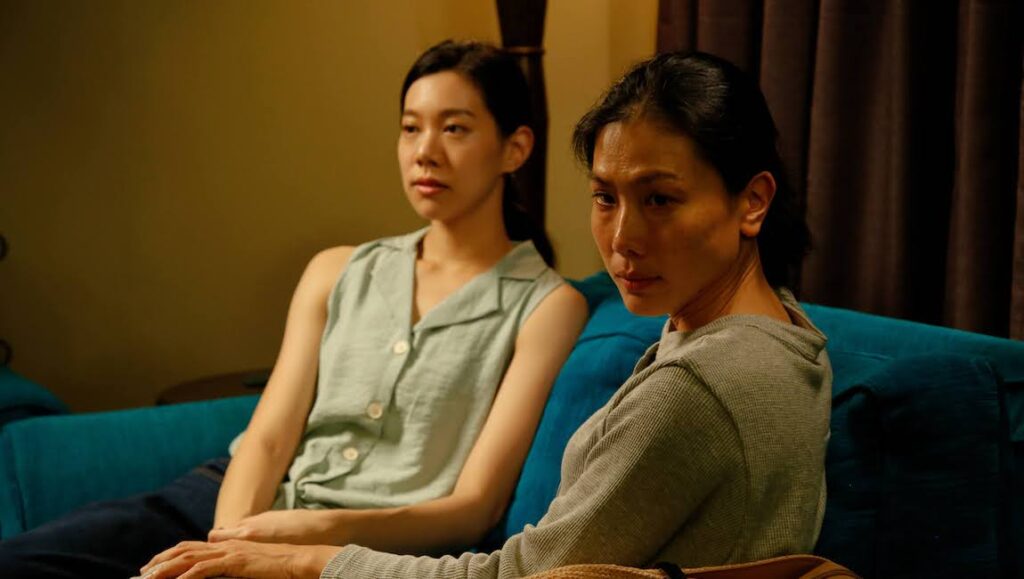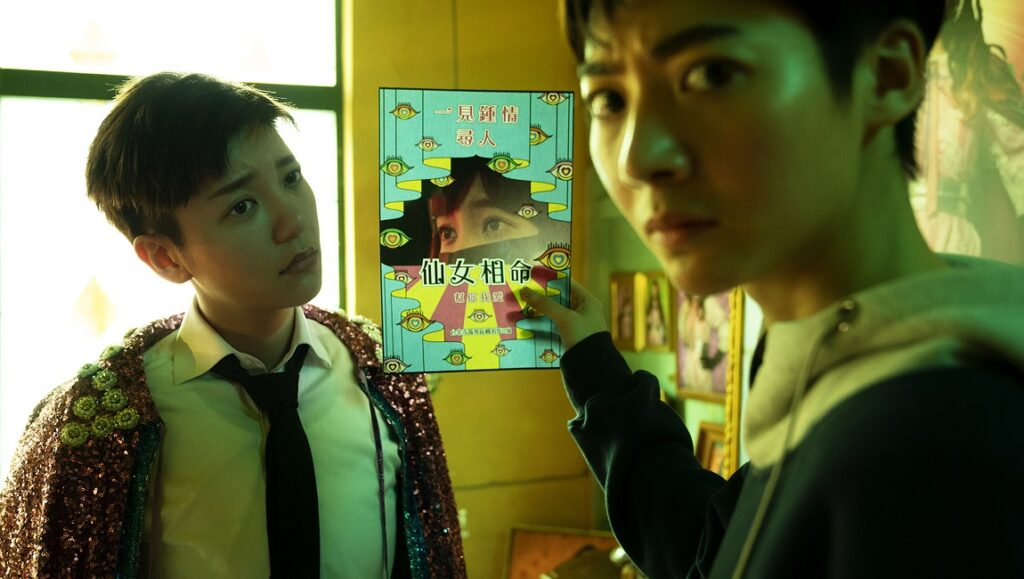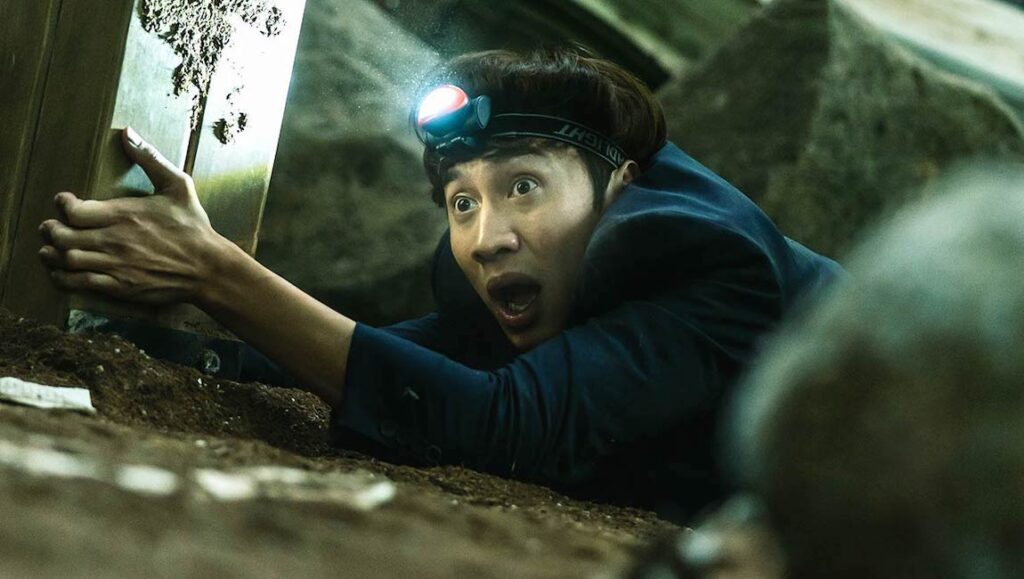Sinkhole
Nearly a decade after his previous feature, the 2012 big-budget disaster movie tentpole The Tower — South Korea’s very belated answer to The Towering Inferno — director Kim Ji-hoon returns to the apartment-building-in-extreme-peril genre with Sinkhole, a goofy and super-dumb yet undeniably entertaining commercial product. No prizes for guessing that this film is indeed about a huge hole in the ground, one that opens up and swallows an entire apartment complex, driving it 500 meters underground, along with a bunch of people inside who must work together to survive and escape their predicament.
Kim takes a good 35 minutes or so setting up his characters for the mayhem to come, with an opening sequence that’s visually bland and undistinguished but infused with mildly pleasant comic touches. Office drone Dong-won (Kim Sung-kyun), after 11 years of scrimping and saving, is finally able to buy that deluxe apartment in the sky, straight out of The Jeffersons theme song. A recurring comic motif concerns his frequent encounters with Man-soo (Cha Seung-won), a local jack-of-all-trades who’s seemingly employed by just about every business entity in the area: he works at a gym, a photo studio, and an Uber-esque driving service, as well as being the building’s super, all the while serving as a single dad to a surly, ungrateful teenage son.
Signs of impending disaster arrive early: marbles belonging to Dong-won’s young son roll on the floor by themselves, indicating the surfaces are far from level; cracks begin appearing on the street outside the building; water pressure in the building disappears. And then, just like that, while Man-soo is on the roof conducting inspections, Dong-won and his work colleagues are sleeping off the previous night’s drunken housewarming party, and Dong-won’s wife and son are out shopping, the whole building sinks straight into the ground, far below the street surface, trapping everyone inside. One can’t help but admire how shamelessly Kim piles on the clichés and contrivances, arranging to have most of the principal characters put together into a single space, although Dong-won remains separated from the rest of his family. Although the CGI effects are surprisingly chintzy-looking, considering the advanced technology available nowadays, Kim still effectively creates tension and suspense with the dangerously unstable fallen building, and with torrential rain impeding the rescue team’s efforts to extract the inhabitants. Characters gain resourcefulness and nearly superhuman strength from seemingly out of nowhere, enemies and rivals become close friends, and Dong-won’s shy coworker even gains the courage to let the object of his workplace crush know how he feels. And in a wonderfully absurd touch, the climactic rescue scene functions as an homage to the Beatles’ movie Yellow Submarine.
The ridiculous Sinkhole was a huge hit upon its recent South Korean release, and as of this writing, sits at number one at the domestic box office. The film hints at certain serious concerns, such as affordable housing being out of reach for many citizens, as well the possible cover-up of architectural defects to falsely inflate property values — and, of course, it’s tough not to imbue this with the weight of the recent Surfside condo collapse in Miami — but the film exhibits exactly zero interest in pursuing these narrative strands. Sinkhole promises viewers nothing more than big, dumb, popcorn-chomping diversion, and on that count, it certainly delivers.
Writer: Christopher Bourne

Barbarian Invasion
In Barbarian Invasion, retired actress Moon Lee (Tan Chui Mui, who also directs), not to be confused with actual retired martial arts actress Moon Lee, is now a divorced single mother looking to do a bit of personal reclamation and regain her former sense of self. Opportunity knocks in the form of a job offer as the lead of a low-budget action movie in which she’d have to do her own stunts. Barbarian Invasion is vaguely reminiscent of docudrama movie-within-movie hybrids like, say, Irma Vep, but with a decidedly less global or socioeconomic preoccupation. Mostly, it’s concerned with our relationship to relationships and then our relationship to art, especially when it’s also a job.
Moon isn’t a trained martial artist, not in the slightest. The bulk of the first third or so of the film is taken up with her slow, often laborious training, at which she does not immediately excel. Complicating matters is the push-pull between her commitment to the work and the care of her young son (who adorably, if frustratingly for her, often tries to spring to her defense when she’s “attacked” by stuntmen). Her director (another IRL collaborator, Pete Teo) remains encouraging, but there’s a lot on the line, and he’s got to repeatedly convince a hesitant Moon to stay the course.
Where Barbarian Invasion excels, though, isn’t in the self-aware tug of war between work and motherhood (although this autobiographical element is superb texture and ultimately the crux of the work); rather, it’s that as the movie-within-the-movie bleeds ever further into reality, we’re treated to a simple, stylish fight picture with some decent displays of athleticism from its director. Tan not only can’t help but channel herself into the character — after all, they’re the same woman — but her abilities as an action filmmaker hold serious promise. The fights aren’t elaborate, but they’re shot with a careful DIY handheld style and edited with a minimum of cuts. Occasionally the performers are a tad slow and feel somewhat rehearsed, but if you didn’t know what to look for, you might not notice. What’s more, the meta-aspect of the film ties up neatly; here’s a woman who feels a loss of control, of agency, of spirit and body, and what better way to reclaim that than to kick a bunch of ass?
Writer: Matt Lynch
Here and There
Filipino romantic drama Here and There opens with feisty heroine Len (Janine Gutierrez) engaging in an online war of words with the earnest and handsome Cabs (JC Santos). The time is March 2020, and Manila is in the first week of its COVID-induced lockdown. A seemingly innocent remark made by Len in regards to the restrictions of quarantine has sent Cabs into a rage. Len’s privilege makes her unable to see the suffering that the mandate is causing the working class, more specifically individuals such as Cabs, who is unable to return home to Cebu to see his family and is instead forced to take up a job as a delivery driver to support them. Len, meanwhile, is profoundly bull-headed, the type of individual who craves the last word. And so begins yet another film that uses the COVID pandemic as mere window dressing in service of cheap genre thrills. The implicit challenge for films situated within this suddenly ubiquitous “sub-genre” is how to distinguish themselves from the deluge of similarly shaped movies being made with lockdown as the inciting action. It’s a challenge that Here and There isn’t up to; director JP Habac and screenwriters Omar Sortijas, Kristin Barrameda, and Alex Gonzales certainly seem to think that they’re saying something meaningful about the effects of COVID on both a global and personal scale, but the reality is that the slop they’re peddling has all the depth of a puddle.
It doesn’t take long for Len and Cabs to meet virtually through a Zoom session; as luck would have it, the two have mutual friends. A begrudging respect leads to nonstop texting and night-long FaceTime calls, as the two begin to develop deeper feelings for one another. Here and There is yet the latest film to ask what love in the time of COVID looks like, and whether it can meaningfully blossom and survive in a pandemic? A question that viewers might be more inclined to ask: what exactly is going on with the film’s portrayal of Len? She’s a fiercely intelligent and passionate twenty-something grad student, and it’s these very attributes that cause her loved ones to label her as difficult. She has never had a relationship, a fact of which her two best friends incessantly remind her; they stop short of calling her frigid —somewhat surprising given the way the filmmakers seem to perceive her — but it’s implied in every conversation and look. Cabs, on the other hand, is a saint, the type of guy who always speaks in a soothing tone, rallies for the underprivileged, and sings and plays the guitar. He even looks good shirtless. The deck is so stacked in Cabs’ favor that it comes as no surprise when the film further attempts to vilify Len by having her react in a reasonably stressed-out manner upon learning that her mother, a nurse at the local hospital, might have COVID. Her quite understandable response so upsets Cabs that he breaks off all contact, which seems extreme, yet Here and There is always quick to take his side. The film takes great pleasure in punishing Len, and while it’s fair to read this whole subplot involving Len’s mother as an argument that most people did not understand the severity of the pandemic until it affected them personally, the sum treatment of Len feels a whole lot like schadenfreude.
The ending, too, is especially perplexing, as the film seems to believe its bittersweet endnote is somehow touchingly realistic, when really it’s but another opportunity to simply dump on Len, even when Cabs’ actions are wholly deplorable. The COVID content only manages to rise to the level of an after-school special, and the “romance” is virtually nonexistent; given those seem to be the film’s twin axes, it’s not clear what we’re really doing here. None of this is helped by the fact that the visuals are flat and ugly, resembling a daytime soap opera more than a feature film (it probably shouldn’t surprise that director Habac has a fair bit of television work under his belt). But if that’s your lane, why not go full Lifetime Network with your premise, instead of offering up something as mean-spirited and unsatisfying as Here and There? To all the Lens out there, you be you; you are deserving of love and allowed to be occasionally messy, regardless of what these filmmakers would lead you to believe.
Writer: Steven Warner

As We Like It
The idea of an adaptation of Shakespeare’s As You Like It, set in an ultra-modern Taipei with an all-female cast, certainly sounds appealing. As does the idea of transmuting Shakespeare’s Edenic Forest of Arden into an internet-free zone of play and gender non-conformity. Unfortunately, filmmakers Chen Hung-i and Muni Wei appear to have been satisfied with only the very cursory reading of this most sophisticated of comedies: at every turn, their adaptation takes what was special in Shakespeare and enacts the opposite. The heroine Rosalind, among the greatest female characters in all of literature, the epitome of poise, ingenuity, confidence, and creativity, is sidelined in her own story.
Rather than serving as author of the play’s action, its heart and soul and conscience, she becomes confused, passive, desperate to find her father, unsure of her feelings for Orlando or of his for her. In the play, Rosalind disguises herself as a boy in order to educate the man she loves in the ways of romance, in how to love her properly rather than in the childish doggerel he pins to every tree in Arden. In this film, there’s no clear reason why she does it, and the educative aspect of the interactions is replaced by a bizarre scavenger hunt to find her father that only serves to further undermine her independence — despite the film’s bird-flipping stance on “the patriarchy who would not allow female actors on the stage,” this is still a far more conservative story than Shakespeare’s. And indeed, the movie’s cutesy aesthetic, all candy colors and animated curlicues and hearts and stars and handicrafts, might as well be the kind of juvenilia the play-Rosalind rejects in Orlando.
The rest of the cast is served no better. Rosalind’s best friend Celia again falls for Orlando’s brother Oliver, but this time in the middle of the story, before he’s amended his villainous ways and proved himself worthy of love. Phebe is transformed into Angel, a psychic, and her story is more or less as it is in the play, while Touchstone, the fool, is hardly present, and when he is, his romance with Audrey (now Silver) is played for schmaltz, not acidic satire. But at least he exists — the play’s other philosophical foil for Rosalind, the melancholic Jaques (who gives the “All the world’s a stage” speech), is wholly absent, with only a couple of his most famous lines moved into a treacly pop tune that carries none of the weight or meaning of his cynical disquisition on the seven stages of life.
The play’s best line is likewise missing, Rosalind’s admonition to Orlando that “men have died from time to time, and worms have eaten them, but not for love.” It’s the essence of the play, the key to Rosalind’s actions and the very heart of her character. It’s what makes her so compelling and fascinating a figure, but there’s no trace of that Rosalind here. This As We Like It is mere pop confection, all icing and no cake. What it ultimately offers is a stomach ache.
Writer: Sean Gilman
Anima
Having first reached the festival circuit in December 2020 at the Cairo International Film Festival, the Mainland Chinese entry for competition at this year’s NYAFF is Anima: the prestige, internationally-oriented “issues” film of the year and directorial debut of newcomer Cao Jinling. The film tells the tale of two lumberjack brothers, Linzi (Wang Chuanjun) and Tutu (Si Ligeng), of the forest-dwelling minority Lonki tribe of northern Inner Mongolia, as their near-prelapsarian youth spent in respectful subsistence with the woods gives way to an adulthood riven with compromises and difficulty as familial tension, sexual politics, nature’s unpredictability, and black-market crime bear upon each sibling as the nation’s modernization drive reconfigures not only their existence but the world around them. By all accounts, the film fits the ethnic minority cinema template almost to the letter, hitting all the notes one would expect dramatically in performance and tone, assuming the mandatory pensive, slow rhythms that signal stress and reflection, and ticking off the narrative beats that underscore the disenfranchised frustration common to the genre. Indeed, much like Cao’s other film of the year — the state-produced COVID-19 documentary Days and Nights in Wuhan — it’s an industry export picture that feels largely anonymous as.
Where the film does excel is largely on the technical side, with famed composer Lim Giong and legendary cinematographer Mark Lee Pingbing doing strong work as ever. Particularly in the case of the latter, it’s difficult to not get the sense that the chance to photograph such undeniably striking landscapes was too good an opportunity to turn up. Additionally, the performance offered by arthouse veteran Qi Xi — here, a hunter and widow who quickly claims Linzi as her man, much to Tutu’s consternation — stands out as the film’s strongest due to the intensity and measure she brings to the film’s one truly proactive character. But even these commendations only serve to highlight the mostly reflexive and automatic character of Anima’s production. While it’s differentiated from other films that fall under its categorization (e.g., Lü Yue’s much worse, hysterical child-kidnapping drama Lost, Found, or the much better Tibetan esoterica of Pema Tseden’s Jinpa or Balloon) due, at once, to both its mannered restraint and seriousness and the surprising decision to pursue a finale informed by where a disaster film (for instance, Feng Xiaogang’s Aftershock) usually begins, it leaves all too much unconsidered and even more unsaid regarding the environmental issues ostensibly motivating it. As such, when the film’s concluding shot hits — that of a wooden toy airplane flying over the picture’s Mongolian forest setting — it’s hard not to feel that the film hasn’t really been doing anything other than floating far above and away from its concerns.
Writer: Matt McCracken


Comments are closed.